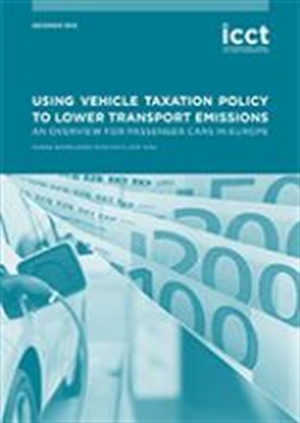ICCT review says tax incentives for EVs can drive uptake
Tue 12 February 2019
View all news

A new report from the International Council on Clean Transportation says that together with legislated emissions limits, appropriate taxes and related policies can help accelerate emissions reductions by giving incentives for buying low emission vehicles, creating a market-pull effect. The report provides an overview of vehicle taxation policy across Europe.
The ICCT says that transport emissions of carbon dioxide have not decreased nearly as much as CO2 from all other sectors in Europe.
In markets such as Germany and the UK the report says that there are comparatively fewer tax benefits for low, compared with high, emission vehicles in the 0–200 grams (g) CO2 per kilometer (km) emission range which were assessed for this report.
ICCT says that the "tax payment curve is relatively balanced in these two markets, with minimal cost increases for owners of cars emitting more than 50 g CO2/km in the case of the UK or more than 95 g CO2/km for Germany. The Netherlands and Norway show the greatest variations in tax-payment curves.
Based on the report's findings, the ICCT suggested recommendations for encouraging the purchase of low emission passenger cars through taxation policy:
-
Create significant tax advantages for low emission vehicles at the point of purchase. Tax payments or tax advantages at the point of purchase have a stronger influence on consumer choice than annual tax payments.
-
Ensure continued tax benefits for low emission vehicles during their use. Lower taxes and lower total costs for consuming electricity compared with higher taxes and total price at the pump for gasoline and diesel fuel can serve as an incentive for consumers to opt for a car with an electric drive train.
-
Account for the emissions of a vehicle as part of the company car tax system. Company cars play an important role in Europe as they make up the highest proportion of new-car registrations in markets such as France, Germany, and the United Kingdom.
-
Balance and regularly re-adjust the tax system to be self-sustaining. To ensure a self-sustaining tax system, vehicle-related taxes need to take into consideration all vehicles, ensure that high-emission vehicles generate the tax revenue to provide tax breaks for low-emission vehicles, and be adapted annually or every two years to account for changes in market structure.
The report was widely picked up in the media, following an article in The Guardian which said that electric cars can already be cheaper to run in the UK than ICE models. However, that was shown to be the case only in particular circumstances. (When a conventional vehicle driver was required to pay a daily emissions charge, such as the London congestion charge for 220 days per year). The report was developed prior to the reduction in the UK's Plug-in Car Grant (Nov 2018).
Related Links
< Back to news list